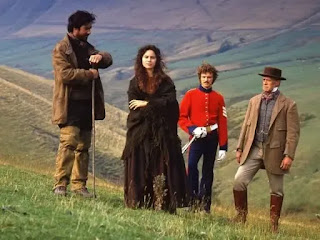The Development of Bathsheba Everdene in “Far from the Madding Crowd”
The most vivid female character of Hardy’s early fiction springs into existence in the portrayal of Bathsheba Everdene in Far From the Madding Crowd. The way in which Bathsheba is introduced, admired, and controlled by the male point of view is entirely relevant to her characterization in the largest sense Her complex struggles with the various male looks she confronts are mirrored by her difficulty with the patriarchal society. Her story depicts both the possibilities open to and the limitations imposed upon, a spirited woman who tries to affirm her individuality in a society unready to accept unconventional behavior, particularly on the part of a woman. From the very outset, Bathsheba reveals her ambivalence about becoming, like most women, a visual and sexual possession, she wishes to live by her own rules and to take charge of her own life. She asserts that she has no sweetheart because “I hate to be thought men’s property in that way” and that she is interested in “being a bride at a wedding if I could be one without having a husband”. She possesses articulateness, almost always an emblem of superiority in Hardy’s fiction, glibly teasing and criticizing Oak in their early encounters, and she is, says Hardy’s narrator, a “novelty among women – one who finished the thought before beginning the sentence which was to convey it”.
Not only is she intellectually in charge, but she is also physically assertive, as in the scenes in which she runs after Oak to clear up a misunderstanding and in which she rescues him from near death, that intriguingly suggests a seduction scene with Bathsheba as the sexual aggressor Oak ironically seems for more ‘female’ than she in these early scenes, struggling with the language he cannot use effectively.
Bathsheba soon progresses from emotional and intellectual control to economic control when her uncle leaves her his farm in recognition of her capabilities. The unpracticed girl’ develops into a ‘supervising and cool woman’ When we see her framed in her bedroom window in a visual moment typical of Hardy’s heroines, the scene has a crucial difference, for she is there giving orders to her male employees. When she makes the speech announcing her decision to be her own bailiff, she performs with great confidence, vowing to do her best and to ‘astonish you all’.
Both Bathsheba’s competence and her desire to succeed are impressive, but she soon encounters a series of difficulties that reveal the dangers for a woman of being alone, being different, and being a cynosure The first of these is criticism from the denizens of the malt house who serve as the rustic chorus. They call her ‘proud as a Lucifer, a ‘very vain feymail’ and her as a ‘tom boy’ and a headstrong maid’ Much of this is petty or jealous, and Oak often attempts to defend her, but even he irrationally blames Bathsheba for the threat once posed to the year’s crops, attributing it to the instability of a woman”. Even when the rustics are not being overly critical, they subtly deprecate with their praise, as when they call her ‘a a handsome body Despite her strengths, Bathsheba cannot escape the seductive situation of being a ‘sight’, a physical object to the male eyes around her.
Though Bathsheba is more fortunate than many of Hardy’s heroines in having confidantes and being an integral member of a closely-knit community, she often feels friendless and unprotected with ‘nobody in the world to fight my battles for me” She also, in spite of her desire for independence, feels some pressure to accept a worthwhile offer of marriage because ‘in every point of view, ranging from politics to passionate, it was desirable that she, a lonely girl, should marry”.
Indeed, Bathsheba Everdene develops through misfortune and suffering from a vain, egotistical girl into a wise, sympathetic woman. Kelly Cleavenger feels that Bathsheba was always a woman who never wanted to be alone, but never was ready to admit it, until the time came when she thought that her independence could turn into a life of loneliness. As human beings we are all “flawed”, however, as readers we recognize that Bathsheba is a realistic and human character precisely because she possesses human imperfections Bathsheba’s progression toward moral growth is not a “transformation” but the simple maturation of a young woman outgrowing selfish childish instincts. “Transformation” suggests the extraordinary, while maturation as Bathsheba experiences is inevitable in human life Peter Casagrande opines that Hardy’s subscription to the Victorian social belief of women as “infirm” prevents him from portraying Bathsheba as a strong woman capable of true moral growth.
